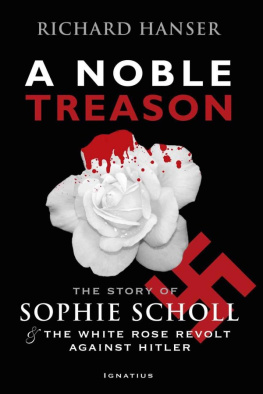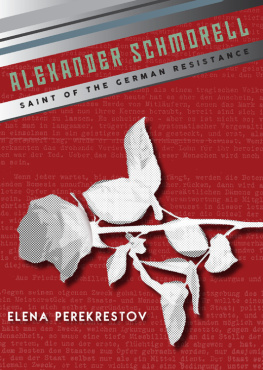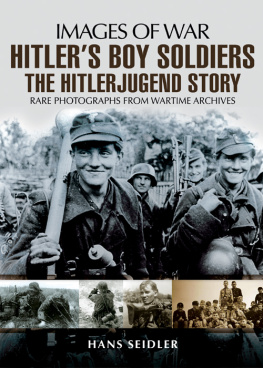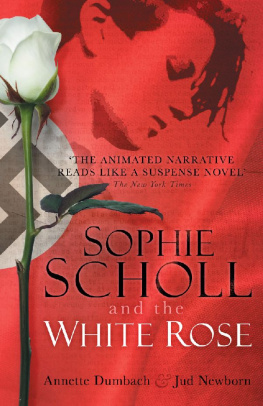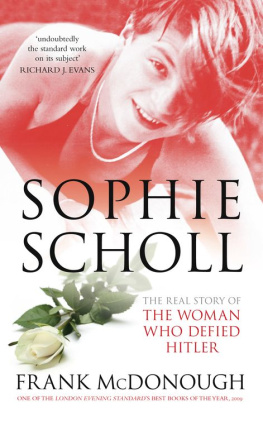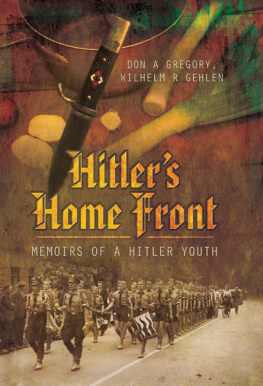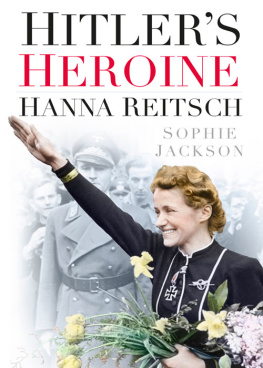A NOBLE TREASON
RICHARD HANSER
A NOBLE TREASON
The Story of Sophie Scholl and
the White Rose Revolt
Against Hitler vs the Revolt of
the Munich Students Against Hitler
IGNATIUS PRESS SAN FRANCISCO
First edition published by G.P. Putnams Sons, New York
1979 by Richard Hanser
Cover design by Riz Boncan Marsella
Photography: iStockphoto.com, Gunter Schillmann
Published in 2012 by Ignatius Press, San Francisco
ISBN 978-1-58617-557-3 (PB)
ISBN 978-1-68149-015-1 (EB)
Library of Congress Control Number 2010937199
Printed in the United States of America
This book is for David
Somebody, after all, had to make a start .
Sophie Scholl before the Peoples Court
Munich, February 22, 1943
CONTENTS
ACKNOWLEDGMENTS
Since the story of the White Rose has never been told on this scale before, the author needed the assistance of many people in gathering and forming the material of this book. None of the episodes and incidents here narrated is invented and none of the dialogue manufactured. Much searching and researching among many sources, both human and documentary, were required to validate the various phases of the story. In this undertaking, chief thanks must go to Frau Inge Aicher-Scholl, the sister of Hans and Sophie. Her short book Die Weisse Rose (it is in no sense a little book) tells the story of the White Rose vividly and movingly from the viewpoint of one in a position to know it best. The book, published in 1952 by the Fischer Bcherei of Frankfurt / Main, is an admirably sensitive, intelligent, and restrained narrative, something of a classic of its kind. Out of a natural, and fully justified, pride in the character and courage of her brother and sister, Frau Aicher-Scholl has made a study of the whole White Rose story and of its significance in the Germany of Adolf Hitler. She has been unstinting in supplying the author with information beyond the scope of her book and answering questions that arose in the writing of A Noble Treason .
The author also gratefully acknowledges the help and cooperation of others, without whose assistance the book could not have been completed. Helmuth Auerbachs collection of documents on the White Rose was indispensable, including as it does interviews, reminiscences, letters, statements, observations, and comments of many of the people who were directly involved. Herr Auerbach magnanimously put his papers at the disposal of the author, who here thanks him again. Thanks are also due to Dr. Hermann Weiss of Munichs Institut fur Zeitgeschichte for his good offices and to the staff of the Institut without whose cooperation no serious book on the Age of Hitler can be completed.
The author also wishes to acknowledge the help extended him at the National Archives and Record Services in Washington (Robert Wolfe, chief, Modern Military Branch); the Berlin Documentary Center (Daniel P. Simon, director); the Koblenz Bundesarchiv (Dr. Ritter); and the Hoover Institution on War, Revolution, and Peace (Agnes F. Peterson). The Reference Department of the New York Public Library was, as always, unfailingly helpful.
Frau Clara Huber was extremely helpful with facts and observations on the part that her late husband, Professor Kurt Huber, played in the events of the White Rose. Her daughter Birgit (Frau Wolfgang Weiss) generously contributed further facts and color relating to her fathers life and death. Of great value was the documentation on Willi Graf assembled by his sister Annaliese Knoop-Graf and others under the title Gewalt und Gewissen . The author also expresses his appreciation for the useful details and illuminating comments contributed by Dr. Katharina Schddekopf, a member of the group around Hans Scholl. I have drawn heavily on the letters, diaries, daybooks, journals, and recorded statements of the people involved, all of whom were literate and articulate and aware of their roles in the events in which they participated.
Acknowledgments are also due the authors of previous writings about the White Rose that were included in the research for this book. Notable among these were James Donohoe, Klaus Drobisch, Ricarda Huch, Karl-Heinz Jahnke, Egon Larsen, Annedora Leber, Christian Petry, Terence Prittie, and J. P. Stern. Research in Munich, the scene of the story, was greatly facilitated by the efficient assistance of Frau Karola Gillich. The author also wishes to thank his wife Anne for help and patience beyond the call of duty in making the manuscript presentable.
R.H.
One
A young Munich barrister named Leo Samberger opened his mail one morning in February of 1943, and, as he said afterward, he couldnt believe his eyes. That was a time when every new day seemed to bring some new event to unsettle the nerves or stun the senses. The war, in its fourth year, had made the unexpected routine and the startling commonplace.
Even so, Leo Samberger was shaken when he opened what he thought was a letter but turned out to be a leaflet. It was neatly typed, singlespaced, with no illustration or typographical flourish of any kind. It was a solid block of type that made no more concession to the reader than a page from a textbook. But Leo Samberger caught his breath as he ran his eye down the page. The day of reckoning has come, the reckoning of German youth with the most detestable tyranny that our people has ever endured...
Leo Sambergers first thrill of excitement was laced with little stabs of suspicion and fear. It was disturbing, a shock, to read such a statement plainly printed in black and white, however much he himself might privately approve of it.
Leo Samberger turned the leaflet over, examined it intently. Could it be a plant, a trap? The Secret State Police, the Gestapo, was not above circulating such material as this to see whether or not the recipient would report it to the authorities. Not reporting it would be almost as grave a crime as originating it. Not reporting it would be taken to mean that the recipient approved of it, thus exposing himself as an enemy of the state. Arrest and prosecution would follow, promptly and inevitably.
But Samberger, who had a degree in law from the University of Munich, sensed immediately that this was not the product of a security agent trying his hand at literary entrapment. This had a cogency that could come only from someone who was at home in the use of language, and it had a passion that only conviction could inspire. We demand from Adolf Hitlers state the return of our most precious possession, the personal freedom of which he has basely and treacherously deprived us...
With an intensity that broke through every phrase, the leaflet denounced the corporal of World War I whose amateur strategy had just cost the German people three hundred thousand of their sons in the bloodbath at Stalingrad. Here the leaflet, in its bitterness, used sardonically the saying that the Ministry of Propaganda had popularized to hail the achievements of Adolf Hitler: Fhrer, wir danken Dir! (Leader, we thank you!).
Then, at the end, came an impassioned call for revolt: The name of Germany will be disgraced forever unless the German youth rises up, in both atonement and vengeance, to crush its tormentors and to build a new and nobler Europe.
Leo Samberger examined the envelope the leaflet had come in. He thought it faintly ironic that the red stamp in the upper right-hand corner had Adolf Hitlers face on it. The address had been typed on the same machine as the text of the leaflet. Why had it been sent to him? How was his address known to the sender? There was no indication at all of where it had come from or who had sent it. It had been folded over like a letter, and now Samberger folded it over once more. He took a thick book from the top shelf in his study and tucked the folded-over leaflet deep inside it. As he was putting the book back on the shelf he automatically swiveled his head around, even though he was alone in the room. That was the gesture which, in Hitlers Germany, had become known as the German look ( der deutsche Blick ): a swift, furtive glance over the shoulder to be sure nobody was watching.
Next page
